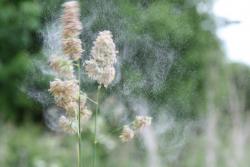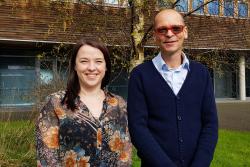Identifying the grass pollen that gets up your nose
 Pollen being released from a common grass species, Dactylis glomerata, also known as cock's-foot, orchard grass, or cat grassScientists could be a step closer to providing more precise pollen forecasts to the 25% of the UK population who live with either asthma or hay fever. This follows the first results of a major three-year project to analyse airborne grass pollen.
Pollen being released from a common grass species, Dactylis glomerata, also known as cock's-foot, orchard grass, or cat grassScientists could be a step closer to providing more precise pollen forecasts to the 25% of the UK population who live with either asthma or hay fever. This follows the first results of a major three-year project to analyse airborne grass pollen.
The first yearβs findings, published in , have shown that it is not just the overall βloadβ of grass pollen in the air that could cause those particularly bad days for asthma and hay fever sufferers. Days which see increased asthma attacks or intense hay fever could be related to the release of pollen from particular grass species.
Current pollen βcountsβ and forecasts assess the whole load of pollen in the air, and, while scientists can distinguish between the pollen created by individual tree and weed species, it has proven virtually impossible for the current forecast methods to visually identify different grass pollens.
Step forward metabarcoding, a technique which enables scientists to automatically identify any fragments of material caught in a sample of air, water or soil, by recognising and matching its unique DNA βbarcodeβ.
For the first time, grass pollens collected over the course of one allergy season have been analysed using this high-tech method. This has enabled the team to start investigating links between certain pollen types and those days on which plant allergy sufferers and people with asthma are most affected.
 Dr Georgina Brennan and Prof Simon Creer who lead the work from ΒιΆΉΝψ.Prof Simon Creer, of ΒιΆΉΝψ, who is leading the research explains:
Dr Georgina Brennan and Prof Simon Creer who lead the work from ΒιΆΉΝψ.Prof Simon Creer, of ΒιΆΉΝψ, who is leading the research explains:
βIβm a hay fever sufferer myself, and I know that on some days, despite a high pollen forecast, I can be less affected than on other days when the forecast appears to be lower. This led me and others to wonder whether itβs the high load of pollen alone that causes the problem, or whether the different grass pollens cause different levels of reaction.β
Dr Georgina Brennan, from ΒιΆΉΝψ who analysed the aerial pollen βenvironmental DNAβ with Dr Caitlin Potter from the University of Aberystwyth and the National Botanic Garden Wales, added:
βBringing a range of specialists together has enabled us to find initial answers. Our task is now to develop a clearer picture of where the pollen comes from, how it moves through the air and how different types of pollen can be linked to allergies.β
Dr Ben Wheeler of University of Exeter said:
βWe are now investigating datasets on hospital admissions and GP prescriptions for certain pharmaceutical products to identify correlations between healthcare data and increases in particular grass pollens. With these new insights into pollen characterization, we are focusing on future implications for pollen warnings and self-care strategiesβ
Dr Rachel McInnes from the UK Met Office added:
βLeading on from this new environment DNA research, we are currently developing maps of where these species of allergenic grasses are located in the UK. When combined with aerial modelling approaches being developed with Prof. Carsten SkjΓΈth at the University of Worcester, the approaches could be used to improve our pollen forecast in the future.β
This research was led by an interdisciplinary team of scientists from ΒιΆΉΝψ, The National Botanic Garden of Wales, Aberystwyth University, University of Exeter, University of New South Wales, Sydney; The University of Queensland, University of Worcester, in collaboration with the UK Met Office, collectively known as PollerGEN (), and supported by a Β£1.2 million NERC Standard Grant.
Publication date: 8 April 2019
